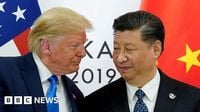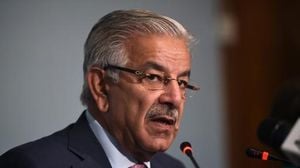In a move that could reshape the contours of global diplomacy and economic policy, President Donald Trump announced on September 19, 2025, that he will meet Chinese President Xi Jinping on the sidelines of the Asia-Pacific Economic Cooperation (APEC) Summit in South Korea, scheduled for October 31 and November 1. This meeting, the first face-to-face encounter between the two leaders during Trump’s second term, comes amid a swirl of high-stakes negotiations, simmering trade tensions, and the unresolved fate of the popular social media platform TikTok in the United States.
The announcement followed a phone call between Trump and Xi, during which the two leaders discussed a range of pressing issues: trade, the ongoing war in Ukraine, and a deal to approve the sale of TikTok’s U.S. operations. According to BBC, Trump described the call as “productive,” stating on his Truth Social platform, “The call was a very good one, we will be speaking again by phone, appreciate the TikTok approval, and both look forward to meeting at APEC!”
While Trump indicated that a deal had been reached to allow TikTok to remain operational in the U.S.—reportedly involving a sale to a consortium of American investors including Oracle—China’s official stance was less definitive. The state-run Xinhua news agency reported that Beijing “welcomes negotiations over TikTok” and that businesses are free to conduct negotiations compliant with Chinese laws. As Xinhua put it, “We hope that the US will provide an open, fair and non-discriminatory business environment for Chinese companies to invest in the United States.”
Despite Trump’s optimism, the specifics of the TikTok deal remain murky. “We look forward to getting that deal closed,” Trump told reporters, emphasizing that the U.S. would have “very tight control” over the app. The fate of TikTok’s powerful content algorithm—central to the app’s appeal for its 170 million American users—has emerged as a key sticking point. Trump sidestepped questions about whether an American buyer would need to develop a new algorithm or could continue using ByteDance’s technology. Meanwhile, a ByteDance spokesperson stated, “ByteDance will work in accordance with applicable laws to ensure TikTok remains available to American users through TikTok US,” and thanked both presidents for their efforts.
The TikTok saga has not been without controversy. In January 2025, the U.S. Supreme Court upheld a law requiring ByteDance, TikTok’s Chinese parent company, to divest its U.S. operations or face a ban. The app briefly went dark before Trump delayed the ban multiple times, with the current deadline set for December. Lawmakers on both sides of the aisle have expressed unease with any deal that leaves ByteDance—or, by extension, the Chinese Communist Party—with influence over the app’s algorithm. Representative John Moolenar, chair of the House Select Committee on the Chinese Communist Party, voiced concerns that “the reported licensing deal may involve ongoing reliance by the new TikTok on a ByteDance algorithm that could allow continued CCP control or influence.”
Friday’s phone call between Trump and Xi was only their second direct conversation since Trump returned to the White House. The first, in June, focused on China’s export of rare earth minerals to the U.S.—a critical issue for high-tech manufacturing. That earlier dialogue resulted in China agreeing to approve a “certain number” of export permits to U.S. companies, a fragile truce in a broader trade war that has seen the U.S. impose 20% tariffs on some Chinese goods, particularly those linked to fentanyl trafficking.
Trade remains a central theme in the evolving relationship between Washington and Beijing. Trump’s first term was marked by a bruising trade war, with tariffs and counter-tariffs disrupting global supply chains. Yet, as Axios noted, Trump has taken a somewhat softer approach during his second term, even as he maintains tariffs and export controls on sensitive technologies. The president has prioritized high-level negotiations, hoping to set aside flashpoints like tech export restrictions and military support for Taiwan in favor of broader superpower dialogue.
For Xi Jinping, the upcoming APEC meeting also comes at a moment of strategic realignment. Earlier in September, Xi hosted a summit in Tianjin with Russian President Vladimir Putin and Indian Prime Minister Narendra Modi, signaling China’s intent to deepen ties with other major powers. North Korean leader Kim Jong Un’s attendance at a military parade in China further underscored the shifting alliances in the region, according to The Hill.
The APEC Summit itself is a major diplomatic event, drawing leaders from nearly two dozen economies across the Asia-Pacific. While anticipation had been building for a formal summit in Beijing later this year—especially after Xi’s invitation to Trump in June—those plans have now been pushed to early 2026. Trump confirmed he would visit China in the first part of next year, with Xi reciprocating “at an appropriate time.”
Chinese state media described the latest talks as “pragmatic, positive, and constructive.” Yet, Xi was clear in urging Trump to avoid “unilateral trade restrictions” on China. He also expressed hope that the U.S. would provide a fair environment for Chinese companies, a sentiment echoed by China’s foreign ministry.
The stakes for both leaders are high. As Politico observed, the Trump-Xi relationship could influence global affairs for decades, given China’s ambitions to rival U.S. global leadership, its close ties to Russia, and its stance on Taiwan. The Trump administration has used tariffs and economic pressure to reorient trade and encourage the reshoring of American manufacturing, but these measures have complicated efforts to build a united front among U.S. allies, especially in Europe.
Trade talks have yielded only a fragile truce on critical mineral exports, with no breakthrough yet on agricultural purchases—a source of anxiety for American farmers reliant on the Chinese market. “It’s Washington that’s hungry for a summit, not the Chinese,” said Craig Singleton, a senior fellow at the Foundation for Defense of Democracies, highlighting the delicate balance of power at play.
As the world watches, the upcoming APEC meeting in South Korea stands as a pivotal moment—not just for the personal rapport between Trump and Xi, but for the broader trajectory of U.S.-China relations. With unresolved questions swirling around TikTok, ongoing trade frictions, and the ever-present specter of geopolitical rivalry, the stakes have rarely been higher. Whether this diplomatic engagement will yield lasting breakthroughs or simply postpone deeper conflicts remains to be seen, but for now, the stage is set for a consequential encounter between two of the world’s most powerful leaders.




